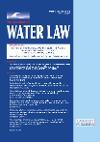Journal of Water Law - Volume 28 - Joint Issues 1 and 2

SPECIAL ISSUE
THE ROLE OF INTERNATIONAL LAW IN TACKLING THE WORLD’S TRANSBOUNDARY WATER CHALLENGES: VOICES FROM EMERGING SCHOLARS
Guest Editors
Dr David J Devlaeminck and Professor Patricia K Wouters
EDITORIAL
The role of international law in tackling the world’s transboundary water challenges: charting a path to 2030 and beyond
DAVID J DEVLAEMINCK
Associate Professor, School of Law, Chongqing University
PATRICIA K WOUTERS
Founding Director, Professor of International Law, International Water Law Academy, Wuhan University
ARTICLES
The compass of equity: applying equitable and reasonable utilisation to uncertainty in international freshwater basins
ZAKI S SHUBBER
Queen Mary University of London
Transboundary water cooperation challenges have been exacerbated by climate change that creates an additional layer of uncertainty. Its disruptive impacts on water availability and combination with other events that cannot easily be anticipated have given it new meaning, particularly in an international context. This raises the issue of how international water law addresses uncertainty affecting shared resources, particularly the role that its principle of equitable and reasonable utilisation could play as an overarching legal basis for uncertainty.
Exploring the rule of equitable and reasonable use on the Helmand river: new insights from interactional international law
MOHSEN NAGHEEBY
Water Security and Sustainable Development Hub, Newcastle University
The governing rule of equitable and reasonable use (ERU) applicable to transboundary waters continues to be scrutinised – is it a cure-all or an inherently problematic norm? This article explores the range of challenges arising in this context, with a focus on how the ERU principle may effectively influence state practice. It concludes that while the ERU principle through its normativity has a persuasive influence on state action, its overall effectiveness depends heavily on the ‘life cycle of norms’ presented in interactional international law, explored here. This acts as a pathway to transforming hydropolitical relations, in this case for the Helmand river basin shared between Afghanistan and Iran. The article offers fresh insights into the expectations of international water law and the normative power of the ERU principle.
The challenge of multi-layer regulatory regimes on transboundary waters – can a community-of-interests approach help? A case study of the Mekong
MAD ANTOINE IBRAHIM
University of Twente, Enschede, Netherlands
Governance of shared freshwater resources is complex because it is implemented at multiple administrative levels across countries. International water law, regional and basin agreements and national laws play different roles in the implementation spectrum. This article analyses how transboundary waters can be managed across multiple layers of water law regimes. Based on this, an illustration of key actors (international community, regional and national ones) in this domain and their roles is examined across the various layers. The Mekong river basin is considered through a ‘community-of-interests’ lens, with a view to exploring how water law regulatory regimes operate in practice.
Islamic law and transboundary groundwater governance in the Middle East and Islamic world – exploring shared principles as a basis for regulatory cooperation
KERRY NEAL
Independent researcher
The Middle East region faces a water crisis in the near future yet the participation of Arab states in multilateral water law agreements remains limited. However, Sharia and Islamic legal traditions contain a large number of rulings and principles which align with international water law. This article seeks to demonstrate the congruence between the treatment of water in Islamic law and the provisions of international water law to explore how this might be used to encourage Muslim-majority states to engage in greater participation in multilateral treaties on water governance, with a focus on groundwater and aquifers.
Managing glaciers in transboundary watercourses: exploring the convergent streams of international water law and international climate change law
CHENJUN ZHENG
School of Law, Zhejiang Gongshang University, Hangzhou, Zhejiang, China
Glaciers are vital sources of fresh water, but they are quite vulnerable to climate change and human activities, even becoming a source of conflict, especially in a transboundary context. International water law regulates the use, sharing, management and protection of transboundary water resources, which should include related glaciers. Despite this, there is limited scholarship on this complicated topic. This article examines the complex nature of alpine glaciers on transboundary waters, identifying the interplay of international regulatory regimes that apply, drawing from international water law and international climate change law and arguing for greater integration of these two fields of law as necessary for effective management of glaciers on transboundary water courses.
The challenge of national implementation of international water law: the case of Mekong hydropower development in Lao People’s Democratic Republic
ALINE TELLE
Environmental Governance and Territorial Development Hub, Faculty of Law, University of Geneva
Effective transboundary water cooperation requires enforceable coherent legal frameworks. Implementing the rules of international law that apply in a domestic context presents considerable challenges. This article examines some of the issues in this scenario through the case study of Lao PDR. After setting forth the key rules that apply in this field, the study examines the historical context within which to explore the evolution of national implementation of equitable and reasonable utilisation in the Lao PDR case study. It concludes with observations on how this offers insights into the broader challenges in this area.
BOOK REVIEW
Defining Effective Transboundary Water Cooperation (Melissa McCracken)
MIHARU HIRANO
Ritsumeikan Asia Pacific University, Beppu, Japan
